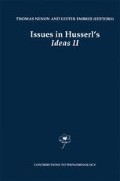Abstract
In his book Being-in-the-World Hubert Dreyfus charges that Husserl’s conception of intentionality cannot account for the practice of everyday coping skills, while Heidegger’s thought can. Drawing from the third section of Ideas II as well as other of Husserl’s works, I pull together a Husserlian intentional analysis of everyday coping to show that Dreyfus is wrong.
Access this chapter
Tax calculation will be finalised at checkout
Purchases are for personal use only
Preview
Unable to display preview. Download preview PDF.
References
See Steven Galt Crowell, Review of Being-in-the-World by Hubert Dreyfus, The Journal of Philosophy, 90:7 (1993): 373–377 and Joseph P. Fell, Review of Being-in-theWorld by Hubert Dreyfus, Journal of the History of Philosophy, 31: 2 (1993): 306–307.
Hubert Dreyfus, Being-in-the-World ( Cambridge: The MIT Press, 1991 ), 13.
Heidegger does not deny that we are conscious.“ Hubert Dreyfus, ”Husserl’s Epiphenomenology“ in Perspectives on Mind,Herbert R. Otto and James A. Tuedio, eds. (Boston: D. Reidel Publishing Company, 1988), 86.
Dagfinn Follesdal, for instance, has located two interesting manuscripts where Husserl analyses practical action in some detail. See Dagfinn Follesdal, “Husserl and Heidegger on the Role of Actions in the Constitution of the World” in Essays in Honour of Jaako Hintikka, Esa Saarinen, et al, eds. ( Dordrecht: D. Reidel Publishing Company, 1979 ), 373, 375.
Although it is somewhat difficult to understand Husserl’s basis for malcing this claim in Ideas g it foreshadows one of the central themes of the Crisis. See Kristana Arp, review of Ideas II by Edmund Husserl, Husserl Studies,8:1 (1991).
It is true that in Experience and Judgment Husserl does identify the prepredicative level of experience as that of the life world (Section 10). But he is interested mainly in the role prepredicative experience plays in founding logical judgment. Husserl hardly discusses how practical interests structure the underlying levels of experience in Analysen zur passiven Synthesis,although he asserts that they do (XI: 150). Besides, Experience and Judgment,put together in 1935, might conceivably been influenced by Being and Time,whereas this part of Ideas II,composed for the most part in 1913, could not have been. Indeed the question with Ideas II is the reverse—whether it had a formative influence on Being and Time. Husserl did send a copy of it to Heidegger early in 1925 (IV: XVI-Translators’
See Dreyfus, Being-in-the-World,5, 22, 30, 85, 249. Dreyfus bases this claim on his interpretation of Section 40 of the Crisis,where Husserl discusses what David Carr translates as “networks of validities” (VI: 151–154/148–151). I do not see how these networks of validities are equivalent to beliefs, though.
Author information
Authors and Affiliations
Editor information
Editors and Affiliations
Rights and permissions
Copyright information
© 1996 Springer Science+Business Media Dordrecht
About this chapter
Cite this chapter
Arp, K. (1996). Husserlian Intentionality and Everyday Coping. In: Nenon, T., Embree, L. (eds) Issues in Husserl’s Ideas II . Contributions to Phenomenology, vol 24. Springer, Dordrecht. https://doi.org/10.1007/978-94-015-8628-3_9
Download citation
DOI: https://doi.org/10.1007/978-94-015-8628-3_9
Publisher Name: Springer, Dordrecht
Print ISBN: 978-90-481-4746-5
Online ISBN: 978-94-015-8628-3
eBook Packages: Springer Book Archive

